Paranoid parents have always known that children’s parks are potentially dangerous places. That rickety seesaw might fling your child skywards. That slide is always too steep. That swing will snap one day. That toy plane that vibrates after you insert a metal token and sings Twinkle, Twinkle, Little Star is wrongly wired and will turn into a death trap.
We think of all these things, but we never think of a suicide bomber blowing himself up in children’s play area on a Sunday afternoon. Not even on an Easter Sunday afternoon. Not even in Pakistan.
We have seen schoolchildren being massacred before, we have seen churches bombed and Christian localities burnt to ashes. We thought we had seen the worst. We were told that we are winning this war. Nothing could have prepared us for the carnage that took place in Gulshan-e-Iqbal park, Lahore, last Sunday.
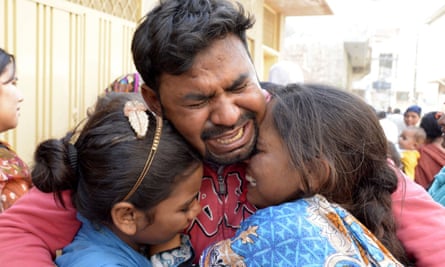
After the first shock and desperate hope that this might be a mini-massacre with single-digit casualties, Pakistani reactions were predictable, as if we had known it was coming. Those worried about world affairs wondered why CNN and Fox News were not covering it the way they covered the Brussels attacks. Was the Eiffel Tower going to light up in Pakistani colours, in solidarity? Surely there has to be an Indian hand behind this? It can’t be an attack on Christians because more Muslims were killed. Within hours of the attack, the laptop warriors were telling the nation that the attack was a sign that we were winning this war. Look, they are attacking the soft targets now. This was supposed to reassure us: the soft targets.
The Taliban group that claimed responsibility was clear in its mission statement: “We have brought the war to your doorstep, it’s an attack on Christians – and by the way, we don’t attack women and children, but you guys don’t leave us much choice, do you?”
We have heard this before. We went looking for distractions.
Every bloodbath in Pakistan is accompanied by a sideshow, which helps us take our gaze away from burnt and bandaged children and wailing mothers. As people with fading hopes were rushing from hospital to hospital looking for their loved ones, thousands of lovers of the prophet were on the rampage in Islamabad. Their demands were simple: give us sharia, give us the right to kill anyone who commits blasphemy. If you don’t, we’ll do to you what those Taliban are doing.
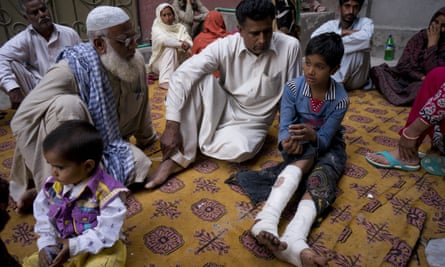
A month ago, Pakistan’s government hanged Mumtaz Qadri, the killer of Punjab governor Salman Taseer, after an exhaustive judicial process. I thought our government was being cunning by hanging Qadri on 29 February; his supporters would have to wait for four years to mark his anniversary. We are always an optimistic lot. As it turned out, his supporters didn’t even wait 40 days. Their demands included that the media be ordered to call Qadri a martyr and the cell he died in be declared a national monument.
Don’t get the mob gathered in Islamabad wrong, they may look like Taliban’s cousins, but they assure us that they are with us in the war against Taliban. Sometimes it takes a slaughter in a public park to remind us that we are in the middle of a war.
Our war, their war
After the 2014 attack on the Army public school in Peshawar, where more than 140 schoolchildren and their teachers were butchered, we decided to go to war. Not just another army operation, but a proper war with fighter jets in the air, tanks on the ground, bloodcurdling war anthems on television, and summary trials and pre-dawn hangings. A final decisive war in which every last terrorist will be eliminated, we are told every day. We are happy because some of us had been asking for this war for a long time. We are loving this war. “Bomb them,” we tell Pakistan’s army, “crush them, hit them with all you have got.” Taliban were very fond of showing us videos of them killing us. Now we say: save us the gory details, kill them and keep the pictures. Sometimes we find out about hangings through a tweet from the army spokesman: four terrorists hanged this morning. Victory.
So much bloodlust among the otherwise faint-hearted, human-rights loving, free-range egg consuming people is a slightly disturbing sight. Many more people have marched in support of Qadri than we have had express solidarity with the families of thousands who have been killed by Taliban. We want the state to protect our lives, property and way of life. Sometimes we are not quite sure that this way of life is pious enough.
For a long time, there was a lingering doubt in our hearts that Taliban are better Muslims than us. We launched half a dozen military operations against them. The army attacked them shouting Allah is great; they attacked us shouting the same louder. If we bombed their caves and compounds, they blew up our naval bases, slaughtered our soldiers, kidnapped the sons of the former prime minister and governor. In this holy cycle spanning a decade, Taliban and their sectarian cousins bombed us in order to make us better Muslims. And we did become better Muslims, but not good enough for them, so they kept bombing us. We kept telling them that there are no fundamental differences between us. We believe in the Khilafa as much as they do, we just didn’t want them to set it up in our neighbourhood. We love jihad as much as anyone does, we just want them to wage it in India, Afghanistan, Syria and Iraq. Not on our streets.
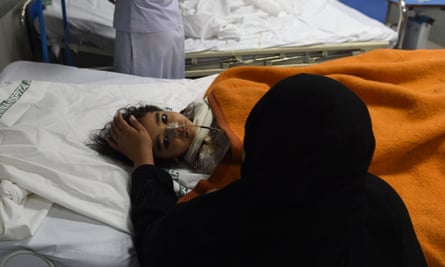
“If the civilian losses are bearable, we should be able to sustain and win this war,” we are told by the retired army folks and other seasonal guerrilla war experts. And the nice thing about this war is that nobody is asking for names of those being killed. Nobody is asking them if they are finding the bombing of their villages bearable.
The coalition that supports this war and its bearable losses include people who also promise that India will disintegrate into a thousand pieces, folks who want to destroy Iran and the US and parts of China, intellectuals who want socialist democracy, those who want a worldwide Khilafa, those who want rapists to be hanged and those who say that a woman should be hanged for mentioning the word rape. Even some sensible Taliban were urging us to bomb those other bad Taliban.
Tribal experts tell us that these people are born warriors, it’s their culture; they are not like us city folks who need private guards and air conditioning. But now it transpires that getting bombed by fighter jets in your own home is not part of anybody’s culture. The war seems to have a simple slogan: blow them up before they blow us up. And if they leave their homes, let them live under an open sky, give them some flour and cooking oil and some plastic sheets. Don’t forget to praise their traditional bravery and hospitality. And don’t forget to support your army, because it’s bombing your fellow citizens to make your streets safer.
While supporting our army sometimes we wonder – but we make sure we don’t wonder aloud – that wasn’t it the same army that has been accused of shooting journalists? Wasn’t it busy organising I Love Army rallies by the same folks who were rampaging in Islamabad this week? How come the army is running the biggest real estate business in the country? Can it focus on a war when it’s busy allotting prime lands to its officer cadre? After all, we don’t ask our estate agents to drive our tanks.
The clues to what we have become can’t be found in the military strategy against Taliban. For that, we need to look at the logic being used by the lovers of prophet, a logic that is more pervasive than any jihadist ideology. Because it’s not only the honour of our own prophet we care about so deeply, we wouldn’t let anybody insult any prophet. Even if it was their own.
Why wasn’t Jesus dressed properly?
In a town named Mirpur Khas in the interior of Sindh, railway police reported another blasphemy a couple of years ago. In any other place, railway police would be tasked with the security of the railway lines, making sure passengers get on and off trains without harming themselves and others. Having lived and travelled in this country for long enough, I have never come across a non-Muslim preacher who has tried to convert me to their religion. It’s always Muslims trying to make us better Muslims.
What hurt the sentiments of the police was that when they opened these travel guides, they saw the figure of Jesus and, as was his habit, he wore nothing but a loincloth. An almost naked prophet? What could be more outrageous than that?
That logic makes perfect sense in a place where an overwhelming majority has never seen any religious icon except their own. If today, they walked into a church they would be appalled to see that Jesus usually isn’t wearing much. And why can’t Christians be left alone to do whatever they want with their own prophet? Because Christ is our prophet, too. Does anyone really believe that when he is resurrected, Jesus will return as a Christian? No, he’ll come back as a Muslim. And if he has learned from his past mistakes, he’ll return as a Sunni.
Hopefully by then, we would have solved our most pressing problem.
What to do about vulgarity and obscenity?
Those who want to blow us up in parks, and those demanding the right to kill us if we are disrespectful, agree on one thing: there is too much vulgarity and obscenity in the society. Not because we routinely get our children slaughtered and then call them heroes, but because there is too much song and dance on television, too many women on advertising billboards.
We all know that in a war that goes on for such a long time, things start to blow up in towns and cities. A couple of years ago a dilapidated little cinema called Shama was blown up in Peshawar. Eleven people died and we worried about what kind of movie they were showing in this cinema. It turned out to be the kind of movie that you can’t watch with your kids. We are apparently top of the list for the countries where people watch these kind of films.
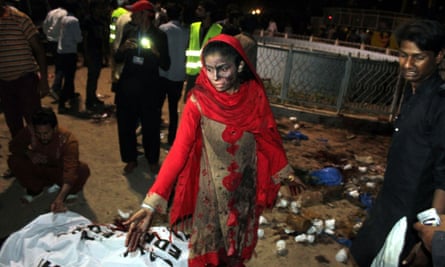
The world loves its lists and loves putting us at the top or bottom of these lists. Pakistan rules the polio charts. Is there another country in the world where women and men who administer polio drops are hunted down like serial killers? There is a perfectly illogical explanation for it; polio drops are meant to make us impotent and these programmes are run by the same people who managed to locate Osama bin Laden by running another scam vaccination campaign. And while we say this, you must also believe us that Osama was never here to begin with.
We are often in the top 10 of those “most corrupt country” lists. In a rather poetic-sounding list called the “fragility index” we are again somewhere at the bottom, or is it on top? We are too fragile to tell. According to one such mythical list popular in Pakistan, we are the fourth most intelligent nation in the world. According to another similarly unreliable list, we are the world’s top porn consumers. A few years ago we were searching for the word “sex” more than any other nation on Earth. That’s quite an achievement (and probably supports the fourth most intelligent nation theory), considering the fact that most websites with any variation of the words “sex”, “girl”, “animal” or “Rushdie” are blocked in Pakistan.
As the rescue workers went through the rubble of Shama cinema, young, slick, newly elected politicians sat in front of TV cameras and shook their heads: “Who can condone such a barbaric attack? Of course, we condemn it, but …”
And then they went on to remind us that the bombed cinema was known for showing blue films. What kind of Muslim can condone that? There was nothing comforting in that explanation except for the quaint, old-fashioned term “blue films”.
It didn’t even occur to us to ask these defenders of our morals whether they have considered the possibility that there can be slightly less harsh ways of dealing with this epidemic, such as issuing a notice to the cinema owner or sending round a few policemen to make sure that the day’s entertainment doesn’t turn blue. No, it seems that there is such a raging desire to cleanse ourselves from the filth shown on our screens that some of us must be blown up. When the TV reporters went looking for the survivors of the cinema attack, they hid their faces and refused to speak. Their shame is understandable because what kind of martyr would you be if you are blown up in the middle of a working day in a sleazy cinema watching a blue film.
Maybe there is a reason that we prefer mullahs to police our morals, rather than the police itself.
A policeman in the city
Hundreds of poorly trained and equipped policemen have laid down their lives for us. We can’t even pay them living wages. We were parked in front of a shop in a Karachi market. A policeman came up to us. He was portly, looked very tired and had a rusty Kalashnikov slung on his shoulder. He came and stood next to the car, staring blankly at us. We rolled down the window and asked what was the matter. We thought maybe we had parked wrongly; maybe he wanted to search the car for explosives. Maybe he wanted to check our identity to see if we were not planning to blow something up. He stood silently and then saluted us clutching his gun to his side. It was a limp salute. It was clear that he didn’t want to protect the city from us or us from the city. He wanted what thousands of children and women and men without limbs want at traffic lights everywhere – some loose change.
Now with police like that, wouldn’t you want your own personal security?
Our own private armies
Long before we went to war, we insured our own personal safety and started to raise armies of private guards. From retired, dozing men with rusty revolvers to fit young men with flashy guns and walkie-talkies; you can buy the security you can afford. They usually live in small tents outside large mansions. Their kind employers have given them small TVs so they spend their days watching television, chatting to families and friends on mobile phones. Sometimes they play loud music from the same phones. The guns they carry cost as much as their yearly salary; sometimes we can see them cleaning their guns. If a speeding car approaches, they become alert. Sometimes they ask for ice as it’s very hot outside on the streets and their employers, or owners as the guards call them, can’t spare any ice. You don’t want the people who are supposed to protect you to get too comfortable with iced water and shade over their heads. Sometimes they accompany children to school or to a football game, sometimes you can see them at drive-thru windows of fast-food joints, collecting chilled shakes and fries for their owners’ kids.
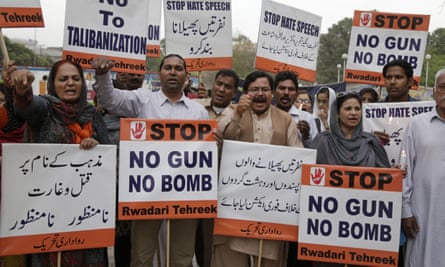
In a country where airports and army bases are breached, people have the right to buy their own security. Right? Specially if they can afford it? Sometimes we need them to save ourselves from other people’s guards.
A lost gunman in the city
We saw a young man barely out of his teens on the roadside, a Kalashnikov strung on his shoulder, a khaki bullet pouch tied around his waist. He knocked at the car window frantically. A mugger, we thought, a mugger in uniform as he wore the standard attire for private security guards. But he didn’t have the aggressiveness of a robber or the poise of a private guard. He was visibly distressed. When we lowered the window, he gave us a piece of paper with a phone number on it. He was from a village, far away from this city, hired as a guard through a cousin. He had arrived early in Karachi after a 26-hour journey. His owners had welcomed him, given him this uniform, this gun, this bullet pouch. They had also given him lunch and in the evening asked him to accompany their kids to a fast-food joint. They had bought some burgers and driven off. They had forgotten that there was a new guard travelling in the back of their SUV. He didn’t have an address; he wasn’t even sure about the name of his new owners. He was in a new city, the biggest he had ever seen. He had an automatic weapon, a pouch of ammunition and a phone number scrawled on a piece of paper.
Sometimes people who can afford private guards can be careless. They can buy security for themselves. They can demand and get wars for people who live a thousand miles away. They can ask for hangings and get them. As the country lurches from a season of bloodbaths to a season of hangings, the temperature in their air-conditioned room never changes. They never have to take their children to a local park because their front lawns are larger than most public parks. They can afford to be careless because they have private guards. They can demand another war. They can bring in more private guards.
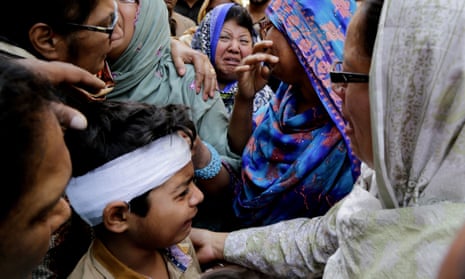
Comments (…)
Sign in or create your Guardian account to join the discussion